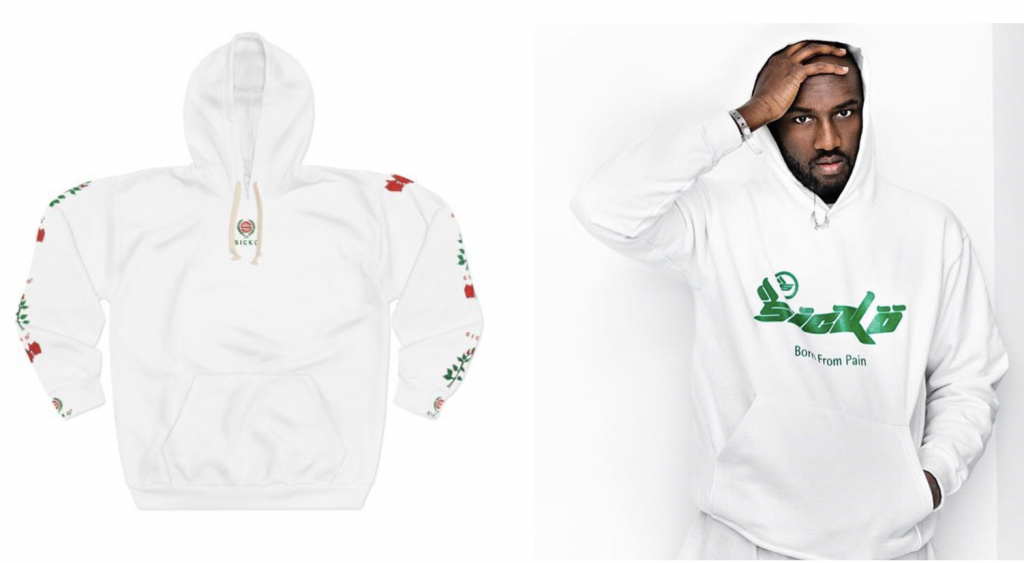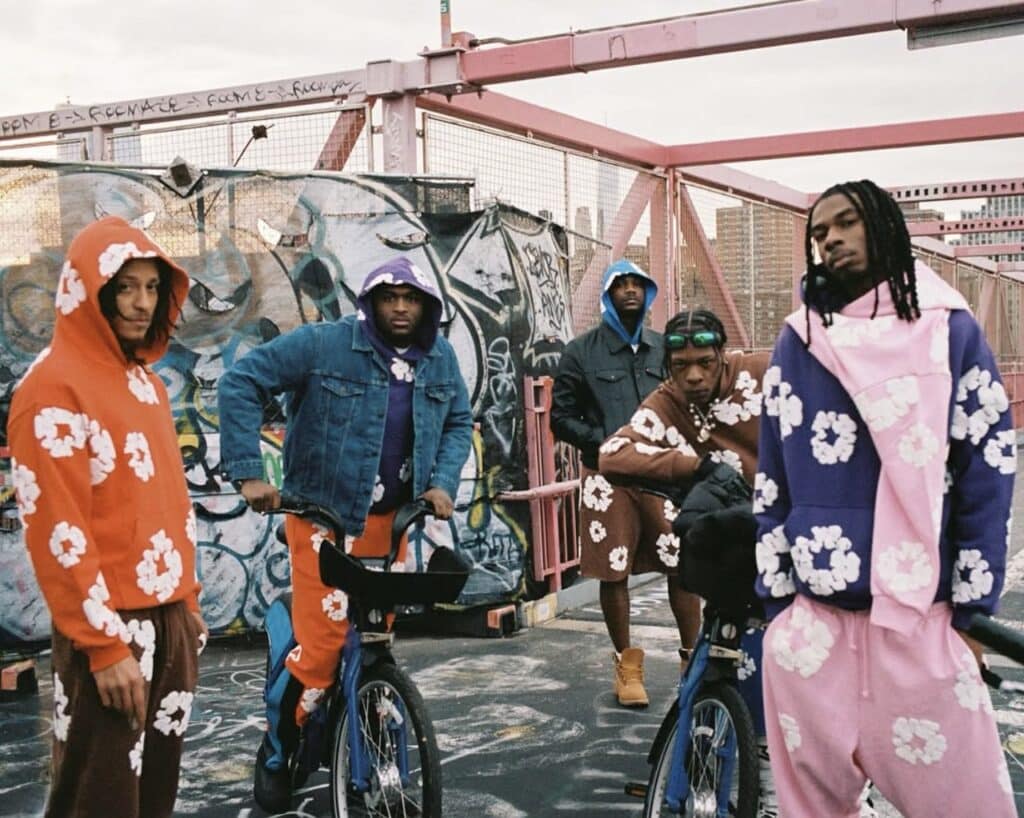TFL EXCLUSIVE – In 2015, Matthew Holman started selling apparel emblazoned with the word “SICKO.” The Lexington, Kentucky native had been making Sicko-adorned t-shirts shirts and colorful basketball jerseys for years for himself and his friends, who have been light-heartedly referring to each other as “sickos” since college, he told TFL. The enduring nickname would inspire the moniker of Holman’s budding young company, one that found fans outside of his group of friends. Thanks to his eye-catching apparel – which now consists of everything from block-lettered t-shirts to water-resistant trench coats with lining that reads “SICKO” – and to a healthy dose of organic marketing, Holman says it was not long before strangers began inquiring about his designs.
Such budding demand prompted Holman, now 33, to start offering up his wares online by way of his website sickoclothing.com in 2015. It was an early attempt to expand his upstart streetwear brand beyond its humble roots. Fast forward a little over five years, and Holman’s Nashville, Tennessee-headquartered startup Sicko has moved beyond just t-shirts and basketball jerseys, and now sells a “wide variety of apparel to customers across the U.S.” In the process, the company says that it has become a “nationally recognized clothing brand with a distinctive reputation of design, innovation, craftsmanship, and credibility in the urban streetwear category of apparel.”
As a result of such consistent use of “Sicko,” the brand name – for which Sicko, Inc. maintains federal registrations after Holman first filed applications with the U.S. Patent and Trademark Office back in 2016 for use on different types of garments and accessories – “serves as the source-identifier for genuine Sicko merchandise, and is used on or in connection with nearly all the products offered by Sicko in the U.S.” More than that, having invested “significant time, energy, and money advertising, promoting, and selling merchandise featuring the Sicko trademarks, as well as ensuring the high quality of the products it sells,” the company asserts that the Sicko brand “is seen by consumers as an authentic urban streetwear brand that need not exploit imagery of sex, violence or vulgarity to appeal to fashionable urban consumers.”
Enter: Ian Connor
Sicko, Inc.’s rise has not been without issues, as in 2018, another brand with the Sicko name – and some less-than-attractive associations – hit the market. As Sicko, Inc. details in a newly-filed lawsuit, formerly celebrated fashion industry figure and alleged serial rapist Ian Connor launched a label called Sicko in 2018, thereby, hijacking the “Sicko” name from Holman’s already-existing streetwear brand. According to trademark lawsuit that it filed in a Tennessee federal court on February 13, Sicko, Inc. alleges that Connor and his corporate entity are among the defendants on the hook for not only “exploiting the [Sicko] mark for commercial gain,” but also “confusing customers about the source identification of the mark, and diluting Sicko’s brand and value of the mark” at the same time.
While Sicko, Inc. may not be in the business of exploiting “sex, violence or vulgarity” to build its brand, that is largely what 28-year old Connor – and by extension, his brand – is known for. The young creative made headlines and found fashion industry fame after infiltrating some of its buzziest circles. As TFL wrote back in 2018, before his industry ouster, Connor could be regularly spotted front row at Raf Simons’ shows, modeling in Kanye West’s Yeezy presentations, and with his face printed all over coveted menswear jerseys. Within a few short years of emerging as a model and stylist in his early 20s, the self-purported “King of the Youth” was collaborating with Kanye West, claiming Virgil Abloh as one of his closest allies, and being hailed as a fashion visionary, as Vogue put it, reflecting on Connor’s rise in 2016.
His industry stature started to change that very same year, Sicko, Inc. asserts in its complaint, as that is when “several rape allegations began to surface for Connor.” The plaintiff states that “by mid-2016, over 21 alleged rape allegations were publicly known, and many of Connor’s celebrity friends and clients began to alienate him.” Ultimately, Connor became “notorious not only for the elite circles he runs in but also for his bad boy persona,” which has been “substantiated by multiple rape allegations and [a] recent incarceration for weapons offenses,” Sicko, Inc. states.
While Connor was in the process of slowly falling out of industry favor in 2018, he, nonetheless, “launched a new brand called ‘Sicko,’ [which he] marketed on social media and sold at least through [his] website www.bornfrompain.jp,” according to Sicko, Inc., which alleges that prior to the commercial launch of the brand, “Connor coordinated with pop culture influencers, such as Luka Sabbat and Virgil Abloh, to promote [his] brand through social media posts.” Meanwhile, Kanye West and Drake were among some of the mega-stars spotted in Connor’s early Sicko brand wares.
Unlike his previously-launched Revenge X Storm brand, Sicko, Inc. claims that “Connor did not apply for a trademark registration to cover his infringing Sicko brand … because he knew of the plaintiff’s Sicko trademark registration.” Unabated, though, Connor rolled out and has continued to run his new brand with the help of his fiancée Raven McEachin a/k/a Raven Tracy, who Sicko, Inc. claims “was widely known to be running Connor’s businesses during Connor’s recent incarceration for weapons offenses.”
“Obscene from its inception”
As a result of Connor’s adoption of the Sicko name for his brand, which has been “obscene from its inception, unapologetically featuring naked children and women with devil horns,” Sicko, Inc. argues that it has suffered “much direct economic harm and public ridicule.” For instance, Sicko, Inc. claims that “messages and publicly posted social media comments” – such as “u ride for a rapist,” “wannabe,” “Cheap Sicko replica,” “Ian Conner bouta file that lawsuit” [and] “Fkin ian connor rip off” – have erroneously accused it of copying Connor’s brand, thereby, giving rise to reverse confusion and/or an unwanted – and damaging – association between the two unaffiliated companies.
(As distinct from traditional trademark likelihood of confusion, reverse confusion occurs when consumers are confused as to the source of the senior user’s goods; the public comes to believe that the senior user – Sicko, Inc. in the case at hand – is actually the junior (or second) user and that the senior user’s goods somehow emanate from or are associated with those of the junior user when no such affiliation exists.)

In other words, “By virtue of all the defendants’ actions, [Sicko, Inc.] has been labelled as a counterfeiter and infringer of Connor,” or alternatively, as working “in partnership with Connor,” both of which have caused the Sicko, Inc. brand to be “devalued” and to lose potential customers. As for Connor’s infringing products, Sicko, Inc. asserts that they “exploit its Sicko trademarks and dilute the wholesome urban streetwear aesthetic [that it] has created.”
As a result, Sicko, Inc. claims that it sent a cease-and-desist letter to Connor in August 2018, asserting its rights in the Sicko trademark, and seeking to put a stop to such alleged infringement by Connor and co. Counsel for Connor’s Olivia LLC responded days later, confirming that “Connor’s infringing Sicko brand would change its branding,” and that Sicko would “not appear on any hang tags, labels, product packaging or goods themselves” taking effect “with Olivia LLC’s Spring ’19 collection, the first delivery of which will be delivered and sold on or about January 15, 2019.”
Despite seemingly reaching a resolution, Sicko, Inc. claims that Connor “directly messaged Holman seeking his number,” and when Holman directed Connor to speak to his lawyer, the since-incarcerated Connor informed Holman that he and his lawyer could “Suck my d[***],” and further stated, “I’m bout to get so rich off my authentic idea while your country bumpkin ass is stuck in Tennessee doing nothing but stressing on Instagram.”
In response to “Connor’s tirade,” Sicko, Inc. contends that it filed a trademark infringement complaint with e-commerce platform Shopify, the host for Connor’s own e-commerce site, and while it was able to successfully takedown Connor’s Shopify account, Sicko, Inc. claims that “Connor and his affiliates have continued to advertise and promote infringing products over [Sicko, Inc.’s] objections” in furtherance of their “willful [and] intentional” plan to “misappropriate the enormous goodwill represented by the Sicko trademarks.”
Moreover, Sicko, Inc. alleges that the defendants’ acts “represent a conscious disregard for Sicko’s rights in the Sicko trademarks,” as they “understand the nature of trademarks and the harm caused by infringing activities.” Sicko, Inc. points to an October 2020 Facebook post from Raven McEachin as proof. In response to “what she believed to be infringing activities” of her own brand, McEachin stated that she “created the pieces that you are profiting off of, that is not cool. You have no idea all that it takes to trademark a brand in multiple countries, multiple classes, and multiple marks … it takes lots of money and time … which I’m working on … but nonetheless, for you to see that as an opportunity to take from what I’ve built makes you a disgusting person.”
Grailed is (allegedly) on the hook
In addition to naming Connor, Olivia LLC, and McEachin as defendants, Sicko, Inc. is also claiming that menswear/streetwear marketplace Grailed is on the hook as it is readily “promoting certain designers, such as Defendant Connor” via a “dedicated Ian Connor page where it introduces the Sicko brand and describes Connor as an ‘alleged sexual predator.’” At the time of this filing, Sicko, Inc. claims that Grailed – which “was aware of [the Sicko, Inc.] brand and [its] trademark, and intentionally infringed [them] and allowed third-party resellers on its site” to do so, as well – had “over 500 items of Connor’s allegedly infringing Sicko brand.”
Grailed “has generated millions of dollars in direct commissions from the sales” of Connor’s infringing wares, all which “intentionally [operating in accordance with] a business model where it avoids responsibility for sales of counterfeit and intellectual property infringing goods while reaping massive profits,” per Sicko, which further asserts that the New York-based marketplace “intentionally obfuscates any way for infringed intellectual property rights holders to assert harms enabled on the Grailed site.”
With the various defendants’ “egregious conduct” in mind, which was allegedly initiated – and allegedly continues to be carried out – “with full knowledge of [Sicko, Inc.’s] prior rights in the Sicko trademarks” and thus, “with the willful intent to cause confusion and trade on [its] goodwill,” Sicko, Inc. claims that it has been subject to “irreparable harm.” Setting out claims of trademark infringement, including reverse confusion, trademark counterfeiting, unfair competition, unjust enrichment, and civil conspiracy “to create, distribute and market infringing products, each having the intent and knowledge of the other’s intent to purposely commit trademark infringement,” Sicko Inc. is seeking injunctive relief and monetary damages.
The company is also seeking an order from the court requiring the defendants “to recall and deliver up for destruction all goods, packaging, advertisements, promotions, displays, and related materials incorporating or bearing the Sicko trademarks or any other mark that is a counterfeit, copy, confusingly similar variation, or colorable imitation of [its] Sicko trademarks.”
Reps for Connor and Grailed did not respond to a request for comment.
*The case is Sicko Inc. v. Connor et al, 3:21-cv-00124 (M.D. Tenn.).














